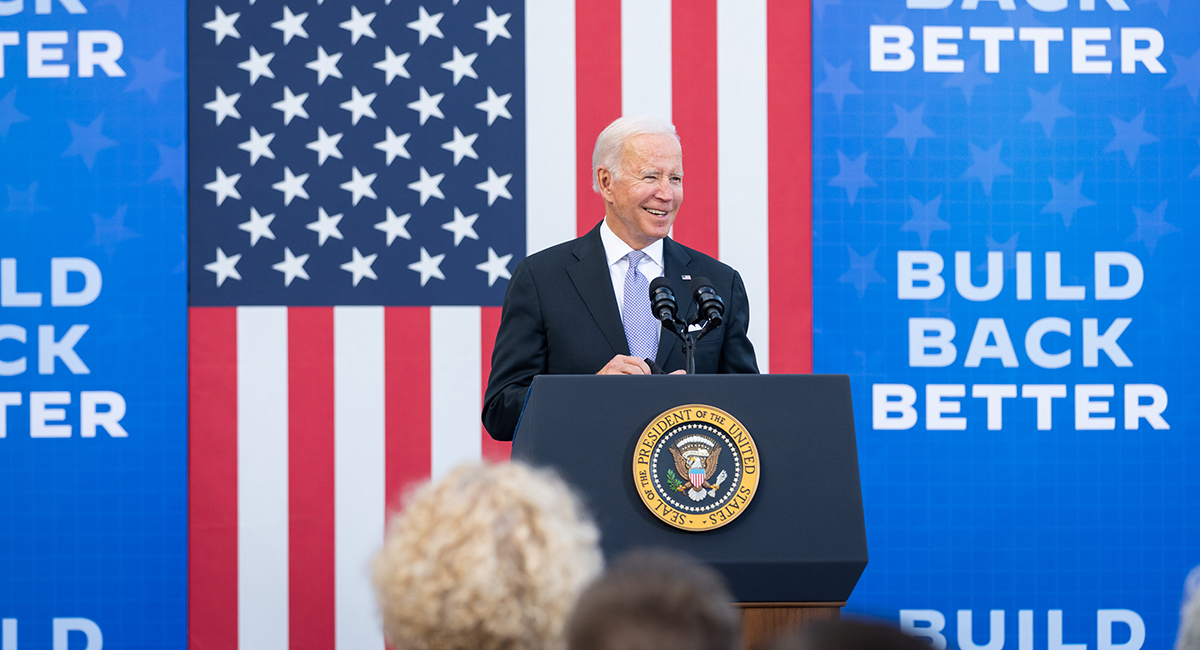Senate Democrats are scrambling to patch together a scaled-down version of President Biden’s failed Build Back Better Act for a vote this summer. Build Back Better was a bad bill when the economy was stronger and even a scaled-down version is worse in our current economic environment.
The original bill died because, with all Republican senators opposed, it needed the support of all 50 Democratic senators. Sen. Joe Manchin (D-W.Va.) withheld his support and walked away from negotiations last December.
Manchin claimed that Build Back Better was “dead” last February when asked about negotiating a scaled-down version and reiterated in April that it was not being revived. Yet, like a zombie in a horror movie, Build Back Better is now among the undead. Although the details haven’t been finalized, it appears that Senate Majority Leader Chuck Schumer (D-N.Y.) and Manchin have made progress on negotiating a scaled-down version of the original bill.
Manchin had numerous problems with the original $2 trillion bill. When he walked away from negotiations he stated that “I cannot take that risk with a staggering debt of more than $29 trillion and inflation taxes that are real and harmful to every hard-working American at the gasoline pumps, grocery stores and utility bills with no end in sight.” He added that Congress needed to “focus on roaring inflation, particularly in the energy sector, as well as a broken supply chain.”
Reports indicate that the revived bill could include about $500 billion in spending, $200 billion of which extends Obamacare subsidies set to expire this year, prescription-drug price controls, and tax increases. It remains less certain which climate-change initiatives might be included in a revived bill.
Manchin was right to walk away from negotiations in December, and he’d be right to do it again. Inflation has accelerated since December. The Labor Department recently reported a 9.1 percent rate of inflation through June of this year. Inflation ran at 7.5 percent in 2021. Meanwhile, although unemployment remains low at 3.6 percent, energy remains expensive, the supply chain is still broken, stocks have now fallen into bear market territory and many fear we are entering a recession.
A scaled-back Build Back Better would only make the current situation worse. Manchin was correct to worry that additional deficit spending could exacerbate inflation. However, the closing of “a tax loophole that benefits the wealthy,” which is reportedly included to help finance the new spending, would harm many businesses and make a recession more likely.
The reported agreement would impose a 3.8 percent tax on people making more than $400,000 on “pass-through business income.” While this might sound like a “loophole” when unexplained, about 95 percent of businesses in the United States are “pass-through” businesses. Any business whose owners pay its taxes as part of their personal income, rather than as corporate income, is a pass-through business.
The provision, estimated to raise $200 billion, is a tax on sole proprietors, independent contractors and many small and midsize Main Street, U.S.A. businesses. These same businesses have struggled through COVID-19 restrictions, rising inflation and supply-chain disruptions. A tax that penalizes businesses that navigate this environment would decrease our already stalled economic growth.
Meanwhile, provisions to control the cost of the Medicare expansion would impose price controls on prescription drugs. Centuries of experience with price controls tell us that, while these price controls might limit budgetary costs, they’ll also lead to shortages, non-price rationing, and reduced incentive to innovate.
A better plan to build back would deregulate blockages in our supply chain while reining in monetary expansion. The Fed has begun tightening. The legislature and the Biden administration could encourage domestic energy production, eliminate the Jones Act that impedes shipping, and end President Trump’s trade wars to help grow the economy.
Meanwhile, prescription-drug costs could be lowered by deregulating some of the Food and Drug Administration’s approval process. The rapid innovation, production and use of new vaccines and pharmaceuticals during the pandemic illustrates only the tip of the iceberg of the potential innovation a permanent fast-tracked approval process could generate.
Unfortunately, it’s unlikely that supply-side deregulation will pass in the current political environment. However, gridlock remains the next-best outcome if Manchin leaves Build Back Better dead.












